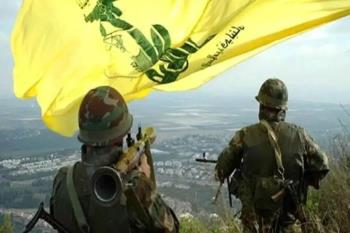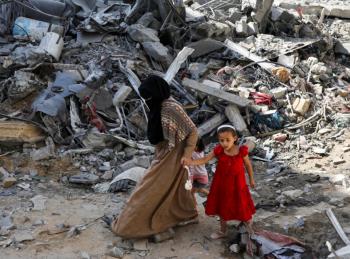Alwaght- French President François Hollande paid a diplomatic visit to Iraq on January 2. It was the second time Hollande visited Iraq during his presidency. The French leader’s trip to Iraq came amid terrorism crisis that the West Asia region was grappling with, and Iraq's struggles to end ISIS terrorist group’s presence on its soil were nearing their conclusion. With these developments in mind, what are the goals behind Hollande’s Iraq visit? In such sensitive conditions in West Asia, what signals and messages can a trip of a top European leader send?
Another significant aspect of the trip is that Hollande’s Iraq visit comes while France has set to hold its presidential election on April 23 this year, and the current president has said that he will not seek re-election. The French president upon arrival in Iraq met with the central Iraqi government’s officials including Prime Minister Haider al-Abadi. From Baghdad he flew to Erbil, the capital of Iraq’s Kurdistan region, where he met with the authorities of the Kurdish regional government.
According to the declaration of the official French sources, France's president visit to Iraq came to address two major objectives: first, discussion of war against terrorism of ISIS and second addressing the Iraqi war refugees. But these routine and “ostensible” objectives cannot be major drives of Hollande’s visit to Baghdad. There are other main goals standing behind the announced, surface goals of trip to Iraq by one of Europe’s top political representatives. To make clarifications on the behind-the-scenes ends of Hollande’s visit of Baghdad, we should bring in spotlight four key issues:
Struggling to secure a place for France in West Asia region
In the past few years, the Western leaders became aware that they have no popularity among the West Asian nations. Without doubt, West’s double-faced and sham counterterrorist war in the region has given rise to waves of aversion among the regional nations to the US and its European allies. Now the West has reached the conviction that the ISIS terrorist group, a phenomenon it crafted, is driven to its end and so it cannot be used to serve the Western objectives in the region. This pushes the Western leaders to pose as being against ISIS and backers of the Iraqi nation, a pretension aiming at repairing the damaged Western image and place in the eyes of the region’s public opinion.
Showing off as being party to anti-ISIS wins
France has been among the small number of active members of the international US-led anti-ISIS coalition. In a time when the decisive Mosul recapture operation is close to its ending, Paris tries to display itself as a major participant of campaign against the terrorists in Iraq. In his joint press conference with PM al-Abadi, Hollande talked about continuing cooperation with the Iraqi army as part of alliance with Baghdad, insisting on further French anti-ISIS airstrikes in Mosul battle. But these efforts of the French president are seen by the analysts as demagoguery to cover up the US and the European supports for ISIS and other terror organizations. Additionally, in the recent circumstances, France in Syria has been facing the scandal of backing terrorism as well as receiving a defeat from the Axis of Resistance. Now by presence in Iraq, the French leader seeks eliminating the impacts of scandal and loss and at the same time attract attention of the Iraqi public opinion to Paris role in providing security in Iraq.
Divisive motivations to split Iraq
When François Hollande arrived in Baghdad airport, no top Iraqi official went to welcome him. This behavior signaled the fact that the Iraqi leaders are well aware that Hollande’s visit will not have that much efficient achievements for them and majorly comes with the intention of inflaming rifts between different Iraqi sides. However, unlike in Baghdad airport, in Erbil airport the Kurdistan’s political leaders held a magnificent reception ceremony for the French leader. Their welcoming was accompanied by signs of Kurdish nationalism. Many of the Kurdish media have highlighted the visit to Erbil as important, calling France one of the first and most important supporters of the Kurdistan independence. Along with President Masoud Barzani of Kurdistan region, Hollande visited the anti-ISIS fronts, meeting with the Kurdish Peshmerga forces near Mount Zardak, which overlooks a plain stretching to Mosul. In general, the French president’s behavior intended to trigger the Kurdish separatist sentiments and to pave the way for Iraq’s partition as he was aware of the Kurd's independence tendency.
Hollande’s Iraq visit's media and propaganda Vs. other Western powers
By the one-day visit, President Hollande attempted to build a humanitarian face for France in the eyes of the Iraqis, but his tough positions against the refugees– many of whom were Iraqi refugees– camping in Calais migrant camp in France rebutted his humanitarian gesture in Iraq. Furthermore, the important thing about Paris's behavior is its competition with the US and other European powers in West Asia, and in Iraq in particular. Countries such as Britain, the US, Germany, and Russia have made many moves to bolster presence in the region, and in Iraq. These measures pushed France to decide to join the game and so not fall behind the rivals. Humanitarian claims and offering support to Baghdad in its anti-terror war are simply masking Paris’s struggle to expand presence in Iraq. Oil sector and arms sales to Iraq are the leading French agenda of this visit.



























